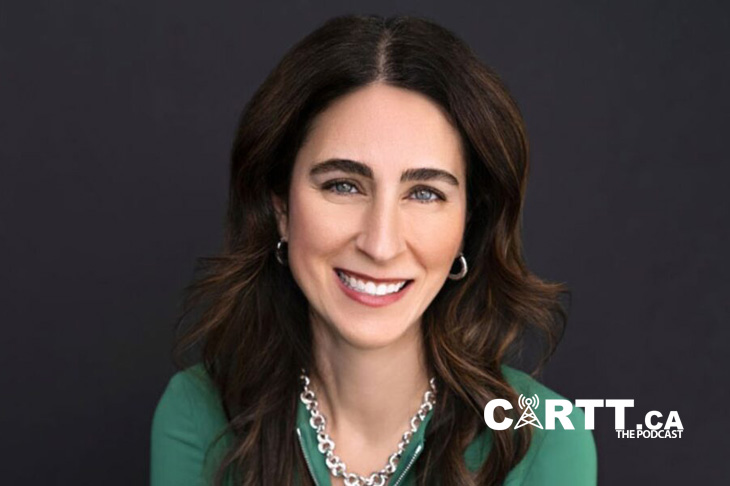Documents filed with Competition Tribunal make full hearing seem likely
By Amanda OYE
OTTAWA and TORONTO – Rogers Communications is still hoping for an expedited resolution to the Competition Bureau’s challenge to its proposed merger with Shaw Communications at the Competition Tribunal but is prepared in the event the deal is not approved by the end of the year.
“Our expectation is that there is a possibility to get a decision from the tribunal this year, following that we would then look to the minister and ISED to provide their approval, which we would expect in due course,” Rogers’ president and CEO Tony Staffieri (above, centre) said to BMO Capital Markets media and telecom analyst Tim Casey (left) at BMO’s 23rd annual Media and Telecom conference earlier this week.
“So, there is an optimistic opportunity for the transaction to close this year,” he said.
Nevertheless, Staffieri explained Rogers is prepared if it does not happen – they have extended the deadline with Shaw into 2023 and they recently announced they have extended their financing to the end of 2023.
The delay in getting approvals for the deal, which was announced in March 2021, does not seem to have dampen Rogers’ spirits.
“While we are disappointed the government has taken quite a bit of time to approve this transaction, we welcome the opportunity for the tribunal to take a very principled and objective view on our file and we’re confident with the position we’ve put forward,” Staffieri said.
The main concern about the deal has been the impact it would have on wireless competition in Canada. To address these concerns, Rogers, Shaw and Quebecor have come to an agreement for Shaw’s Freedom Mobile to be sold to Quebecor subsidiary Videotron.
“We think we’ve addressed all the issues the government has put in front of us and look forward to the tribunal process,” Staffieri said.
As part of that process, a hearing has been scheduled to begin Nov. 7, 2022.
Staffieri told Casey the hearing is scheduled to last about a month, but “given that we now have a remedy proposal in place we expect that to last a few weeks.”
Should a hearing and tribunal decision be necessary, either party could appeal to the Federal Court of Appeal once a decision is made – “in the event that an appeal is granted, then that would add several months to the process,” he explained.
The tribunal hearing is not necessarily inevitable.
“There is a scheduled mediation with the Competition Bureau on October 27,” Staffieri said. “We welcome a dialogue to try to close this then or even before that.”
Staffieri added they “strongly believe” the interests of all stakeholders are better served by an expedited resolution to this file – consumers in particular.
“We’re open to that, but we haven’t had any meaningful response from the bureau to move this file forward ahead of the tribunal,” he told Casey.
Cartt.ca reached out to the Competition Bureau for a response to this statement. A bureau spokesperson said they are aware of Staffieri’s comments and reiterated information from a previous statement sent to Cartt.ca, including that the bureau remains “firm” in its decision to challenge the merger and confirms there is potential for a second mediation session to be held in October. (The first was unsuccessful.)
The spokesperson said the bureau is “not in a position to comment further, nor would it be appropriate to speculate about potential outcomes.”
Documents filed with the tribunal over the last couple of weeks suggest neither Rogers and Shaw nor the Commissioner of Competition is willing to concede their positions. The documents include fresh as amended responses from Rogers and Shaw, filed on Aug. 19, which contain information about the proposed divestiture of Freedom to Videotron.
(All public documents filed with the tribunal related to the Rogers/Shaw file can be found here.)
While Rogers and Shaw believe the divestiture addresses competition concerns raised in relation to the proposed merger, the Commissioner of Competition has maintained the remedy proposal is insufficient.
“Neither the Proposed Transaction nor the Divestiture will contribute to the efficiency and adaptability of the Canadian economy but would require consumers of Wireless Services in Ontario, Alberta and British Columbia to pay materially higher prices, have fewer choices and experience a deterioration in the quality of Wireless Services,” the commissioner argued in a reply to Rogers’ submission, filed Sept. 2.
In a response to a request from Rogers for more information, the commissioner filed another document with the tribunal this past Monday detailing why he remains concerned about the fate of Freedom in the hands of Videotron and why he argues the divestiture of Freedom would make it a “substantially weaker competitor”.
For example, should Videotron be allowed to acquire Freedom, the commissioner is concerned about the loss of the benefits Freedom gains from its integration with Shaw.
This includes, according to another document submitted by the bureau to the tribunal, the “significant integration of Freedom mobile within Shaw’s organizational structure and, importantly, Freedom Mobile benefits from its parent’s related businesses and operations, including Shaw’s network infrastructure, Wi-Fi Hotspots and backhaul.” (Shaw, however, has previously said Freedom was built and operated to be easily separated from Shaw.)
The commissioner also indicated he is concerned about the dependence he argues Videotron as the new owner of Freedom will have on Rogers due to “various agreements with Rogers, some of which are still being concluded…”
In addition to concerns about Videotron’s ability to compete effectively as the new owner of Freedom, the commissioner has previously indicated (and maintained in his reply document), that the sale of Freedom on its own is not a sufficient remedy, arguing it would not replace the “significant” competition delivered by Shaw Mobile.
Screenshot featuring Casey, Staffieri and Rogers’ CFO Glenn Brandt taken from the webcast of BMO’s Media and Telecom conference.



